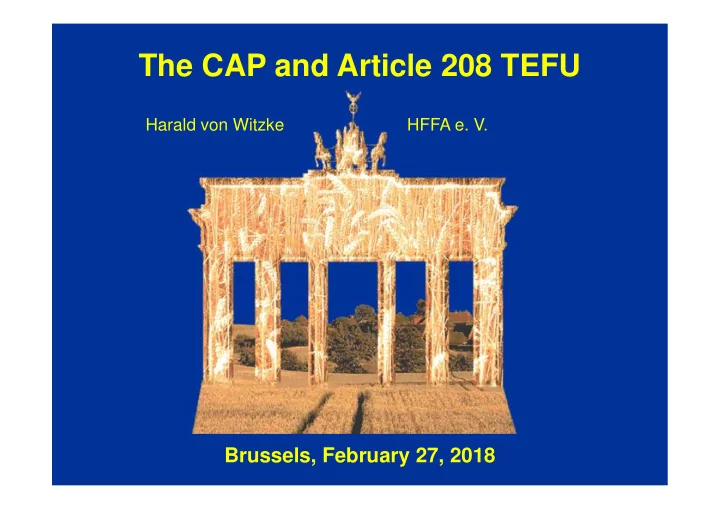

The CAP and Article 208 TEFU Harald von Witzke HFFA e. V. Brussels, February 27, 2018
Art. 208 TEFU central objective • Reduction and eventual eradication of poverty. • Obviously: Poverty, and hunger and agriculture are closely related. • The vast majority of undernourished humans live in the countryside of poor countries (smallholders, landless, net food buyers). • Agriculture is a key to reducing poverty and hunger. 2
1. The international environement of the CAP 1 • The long term trend of decling commodity prices has ended. • Since 2000, upward pointing trend in prices. • Reason: Global demand growth is outpacing growth in supply. • Growing food import gap imany poor countries. 3
1. The international environement of the CAP 2 • Market developments raise concerns about food security in LDCs, • and their attendant cost: Hunger, political instability, violence, migration. 4
1. The international environment of the CAP 3 • Global demand growth could be met by – acerage expansion, or by – rising productivity. • As land is limited production growth must come primarily from productivity growth. • However, productivity growth has been declining since the Borlaug Green Revolution. 5
1. The international environment of the CAP 3 • 3 Reasons for decreasing productivity growth: – Neglect of agricultural research. – Increasing restrictions on the use of productive technologies in the EU (e. g. traditional gene technology, crop protection). – Successful lobbying of groups which favor low productivity agriculture. 6
1. The international environment of the CAP 4 • The growing food import gap of LDCs can only be closed by rich countries producing and exporting more food. • EU one of the largest net importers in food and agriculture – on the commodity level. • EU land footprint in ROW: 17-34 mill. ha. 7
2. Implications for the CAP 1 • Agricultural research policy aimed at sustainably raising productivity should be integral part of the new CAP. • The benefits of productivity growth are huge (positive externalities mostly for developing countries) and justify public research funding (Pigou subsidy!). • Environmental benefits far outweigh the (traditionally only considered) effects on social welfare: 8
Implications for the CAP 2 Source: Noleppa, von Witzke, Cartsburg, HFFA research • Every percentage point productivity growth in EU agriculture: – raises social welfare by € 500 million, – reduces net EU imports of virtual agricultural land by about 1.2 million ha, – preserves 1.2 million ha of natural habitats, – reduces CO 2 emissions from avoided expansions of the global agricultural acreage by 220 million tons (at € 200 per ton of CO2: A € 44 billion value to society al large), and – preserves global biodiversity equivalent to up to 600 000 ha of tropical rainforest. 9
2. Implications for the CAP 3. Productivity growth: Intensificatiom vs. innovation, EU, 2003-2013 Source: Noleppa and von Witzke, HFFA research Yield per ha Tfp growth and year (%) per ha and year (%) Wheat 0.86 1.44 Corn 1.26 1.86 Oilseed rape 0.98 1.58 Sugar beets 2.46 3.06 Potatoes 1.85 2.45 10
2. Implications for the CAP 4 • EU yield growth has been realized at declining intensity of land use. • Recommendation: Get rid of the concept of sustainable intensification. • It implies that yield growth requires intensification. • Rather the opposite has been true in the EU and other developed countries (e. g. USA) 11
2. Implications for the CAP 4 • By analogy, „ecologic“ farming ought to be taxed rather than susidized, as being done under the present CAP. • Overall yields in „ecologic“ farming are about half of modern farming. • Moving to ecologic farming in the EU,would mean that global cropland would have to be expanded by 70 million ha. • With all the attendant cost to society at large (in particular to LDCs). 12
2. Implications for the CAP 5 • Stop subsidizing low productivity agriculture (aka „ecological“ farming) : – It is BAD for the environment, biodiversity, climate and the preservation of natural habitats, – AND for the POOR an HUNGRY in DEVELOPING COUNTRIES. – Reduced production acts to a rising price of food, and increasing hunger, and it leads to significant environmental damage. 13
2. Implications for the CAP 5 • Base CAP decisions on scientific evidence rather than lobby groups (in particular those favoring for low productivity agriculture. 14
3. Conclusion • Only with science based, highly productive agriculture AND science based safety regulation will the world be able to feed 10 billion by 2050, and at the same time preserve our environment, our natural resources and our climate. 15
3. Conclusion • Remember Giordano Bruno. • Science must never yield to political dogma! • Seek advice from recognized scientists and not from NGOs! 16
Thank you for your attention. Additional information is available at: www.hffa-research.com 17
Recommend
More recommend